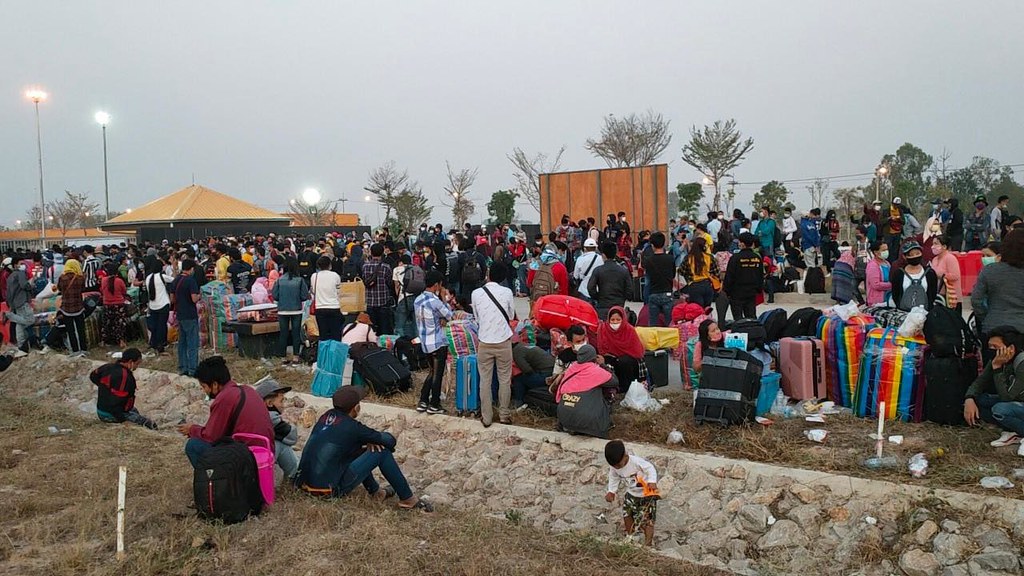On Workers’ Memorial Day, and World Day for Safety and Health at Work, MPs are calling for Southeast Asian governments and companies in the region to increase efforts to protect workers’ rights to healthy and safe conditions amidst the COVID-19 pandemic.

Migrant workers waiting to cross the Thai-Myanmar border at the Thai–Myanmar Friendship Bridge checkpoint in Mae Sod on 23 March 2020 (Source: Sai Tun Shwe)
"Every day millions of workers in Southeast Asia are going to work so that our countries keep running, but many are being forced to do so in dangerous conditions that put them at risk of contracting or spreading the virus,” said Chamnan Chanruang, a former Member of Parliament (MP) of Thailand and member of ASEAN Parliamentarians for Human Rights (APHR). “ASEAN governments must work with employers across all sectors to immediately step up action to make sure that everyone’s right to healthy and safe conditions at work are respected: if these workers are not protected, no one is.”
Countries in the region have shut down some of their economic activity but work continues in many places. This includes, for example, workers in export-oriented industries in the Philippines, food manufacturing and packaging employees in Singapore, construction workers in Indonesia, and those employed in the factories of Special Economic Zones in Vietnam. For many, there is no option other than to continue to work, despite the health risks involved.
"Many workers are in an incredibly difficult scenario; they need to earn money, but are being asked to conduct their work in conditions that lack hygiene supplies and facilities. In the Philippines, for example, workers were made to sleep on the floor at their workplace for 30 days in subhuman conditions that did not respect social distancing. This abuse of workers must stop,” said Chamnan Chanruang.
Women workers are particularly at risk, said APHR. On average women spend more than three times the amount of time doing unpaid care work compared to men. With the pandemic and the closing of schools, childcare and other facilities, women workers are facing increased work, mental and physical pressures. Pregnant women also face potential additional health risks. Employers and governments must consider these gendered impacts of COVID-19 when ensuring safe and healthy conditions at work.
Another group particularly at risk is healthcare workers. The lack of medical and protective equipment provided to health workers is extremely concerning. APHR notes that in Indonesia medical worker associations have threatened to stop treating COVID-19 patients if the government does not ensure the availability of protective health gear. Women make up more than 70 percent of the global health workforce.
"Healthcare workers, most of whom are women, are the ones keeping us safe, and in many cases alive, during this crisis. It is essential that we do the same by protecting their rights and providing them with the materials and equipment they need. If they get infected, who will treat those who get sick?" said Anthea Ong, Member of Parliament of Singapore and member of APHR.
APHR also called on companies to step up their actions.
According to the United Nations Guiding Principle on Business and Human Rights, businesses must undertake due diligence and mitigate any harm to the health of workers. Moreover, the World Health Organization and International Chamber of Commerce have issued a private sector call to action to tackle the pandemic, and say all businesses must play their part in minimising the transmission of the virus and its impact on society.
Yet despite this, many companies in Southeast Asia have not been transparent in sharing information regarding their plans to protect their workers from catching or spreading the disease in the workplace, APHR said.
"If we want to tackle this pandemic, we need all employers to be transparent about how they plan to protect workers from the virus, and for those measures to be enforced throughout the organisation and apply to all workers, without discrimination,” said Ong. “These plans must be achieved through social dialogue and negotiations with workers and trade unions. It is only through such dialogue and by respecting their rights that we will truly tackle this pandemic.”
Prachatai English is an independent, non-profit news outlet committed to covering underreported issues in Thailand, especially about democratization and human rights, despite pressure from the authorities. Your support will ensure that we stay a professional media source and be able to meet the challenges and deliver in-depth reporting.
• Simple steps to support Prachatai English
1. Bank transfer to account “โครงการหนังสือพิมพ์อินเทอร์เน็ต ประชาไท” or “Prachatai Online Newspaper” 091-0-21689-4, Krungthai Bank
2. Or, Transfer money via Paypal, to e-mail address: [email protected], please leave a comment on the transaction as “For Prachatai English”
